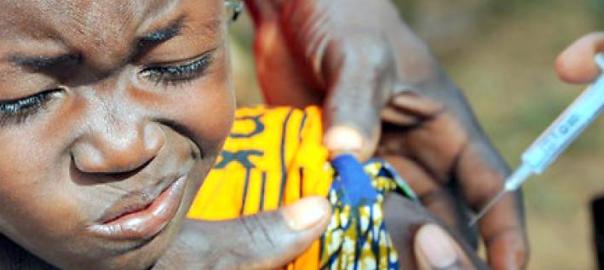
The late Dr Ameyo Adadevoh, the heroine of the struggle against Ebola in Nigeria
It must be a summoning to reflexivity that in the first week of April 2017, an outbreak of cerebro-spinal meningitis, (CSM) has claimed no less than 400 victims in Nigeria even though the first signs showed up in November 2016. It could be CSM today but something even more terrible tomorrow as was the case of Ebola 2014. In the case of Ebola in 2014, Dr Ameyo Adadevoh did her duty to fatherland with the kind of discipline, scrutiny and vigilance that is rare nowadays. She paid the supreme sacrifice but saved so many. But for her, the rate of deaths would have overshot an acceptable degree. This time, there was no Adadevoh. What we have in abundance is finger pointing and a blame game, including sometimes blaming the victims, either for not reporting early enough in the hospital or implicating crowded living. Governor Abdulaziz Yari of Zamfara, so far the worst affected state, has even concluded that the outbreak is God’s punishment for the Sodom and Gomorrah, (the Biblical headquarter of sinning) he believes we have made of Nigeria. By the theology according to His Excellency, God has a way with people such as Nigerians and it is by sending strange illness that has no cure as punishment. Meanwhile, that is the same governor who declared in July 2016 that he could run the state from anywhere on the globe and that his frequent trips outside the state had no negative impact on governance. And the state branch of the Nigerian Medical Association, (NMA) is holding him responsible for not responding to the danger signals about this outbreak.

Gov Abdulaziz Yari of Zamfara State
It is doubtful if God has anything to do with this, considering the abundance God has showered on the country and after giving human being the capacity to tame the world for collective survival. That is why, in most societies, it is not possible for about 400 persons to die in the circumstance in which that has just happened without somebody or some people paying for it. Who could be those be and would he or she or they pay for negligence in this case? The first problem is where to locate the negligence. Is it with the global health governance architecture in Nigeria, given that the CSM outbreak is a threat to global public safety in the light of the diffuseness of the ‘global’ today? Or, is it the federal health machine, (Federal Ministry of Health; National Primary Healthcare Development Agency, National Centre for Disease Control, Senate and House Committees on Primary Health Care, the Nigerian Medical Association, The Presidency and so)? Could it be the authorities at the state level in the worst hit states? This question should not be part of the problems of managing the next outbreak or epidemic, whichever, whatever or wherever it might be more concentrated.
Secondly, it doesn’t look like the managers of outbreaks such as this consider the poverty and underdevelopment context in which they happen. When Thabo Mbeki, former president of South Africa argued that HIV/AIDS is more of a poverty crisis than medical, the world went after him. But he made a bold statement nevertheless. Three conditions are said to aggravate CSM. One is personal hygiene about which majority of the populace are neither literature nor vigorously sensitised to appreciate and imbibe in their daily lives. Second is environmental hygiene which is almost impossible in either the space less settlement pattern in both rural and urban locations or in the slummy nature of same. The third is over crowding which is a problem even for the elite. The rather morbid governmentality in the case of this outbreak shows no awareness of the poverty, illiteracy and general underdevelopment within which outbreak of CSM type C or even more dangerous types around Nigeria take place. Is this denial or just avoidance?
 The last point that the outbreak appear to have brought out is how Nigeria is locked into a stalemate in terms of responding to challenges in the health sector. The element of ‘early detection, early response’ doesn’t appear to ground the system’s ways. Yet, that is the overarching wisdom underpinning health delivery. If there were signs of a CSM outbreak in November and we are still talking of costly and scarce CSM drugs, then something is wrong with the surveillance and intelligence component of the delivery system. It is to capture the primacy of such features as intelligence, surveillance and anticipation that the nomenclatures have been changed to reflect that trend. Thus, instead of global health information, it is global health intelligence people talk about. Or, instead of global health governance, some people talk of global health security. Since that logic saved the world from SARS outbreak in 2003, it has become a key building block of health governance at the global level. An implication is that epidemiological evidence, for instance, is no longer the sole determinant of the first move in a health emergency. In the age in which the global and the national have fused considerably, CSM outbreak shouldn’t have caught Nigeria napping again in 2017.
The last point that the outbreak appear to have brought out is how Nigeria is locked into a stalemate in terms of responding to challenges in the health sector. The element of ‘early detection, early response’ doesn’t appear to ground the system’s ways. Yet, that is the overarching wisdom underpinning health delivery. If there were signs of a CSM outbreak in November and we are still talking of costly and scarce CSM drugs, then something is wrong with the surveillance and intelligence component of the delivery system. It is to capture the primacy of such features as intelligence, surveillance and anticipation that the nomenclatures have been changed to reflect that trend. Thus, instead of global health information, it is global health intelligence people talk about. Or, instead of global health governance, some people talk of global health security. Since that logic saved the world from SARS outbreak in 2003, it has become a key building block of health governance at the global level. An implication is that epidemiological evidence, for instance, is no longer the sole determinant of the first move in a health emergency. In the age in which the global and the national have fused considerably, CSM outbreak shouldn’t have caught Nigeria napping again in 2017.

Bill Gates, one of the most powerful actors in global health governance today
The element of heat at this time of the year in the northern part of the country, compounded by climate change impacts might appear to make a CSM outbreak inevitable. But if this argument were to be acceptable, then why have traditional sovereignty (ministers, governors, presidents, the UN, etc) yielded ground to the authority of experts in domains such as health delivery? It is the authority of experts that makes the voice of campaigners, advocacy warriors, the media, corporate individuals such as Bill Gates and INGOs referent actors. As it is at the global level, so it is or ought to be at the national level. If the experts are not there, then that is an honest gap for the political leaders to openly admit. With the migration to Europe, North America, Asia and the Middle East, it is likely that Nigeria hasn’t got the experts in the real sense of the word. What a pity!




























